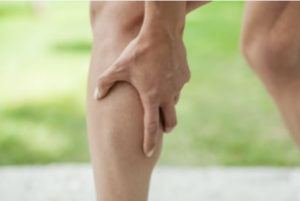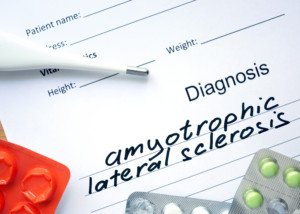
Does the longer a muscle twitches in a specific spot mean it’s more likely to be a motor neuron disease like ALS or some other serious neurological disorder?
We’ve all had that occasional eyelid twitch, or maybe after running hard outdoors you find that a calf muscle won’t stop twitching—until you awaken next morning.
But how long, really, can a twitching muscle keep occurring in the same spot?
“Fasciculations” is the term that refers to twitching muscles.
“Muscle twitching could occur for hours or intermittently for weeks and have a benign cause,” says Kathryn Boling, MD, a board certified family medicine practitioner with Mercy Medical Center in Baltimore, MD.
“If muscle twitching occurs intermittently in any muscles (eye, legs, etc.) for more than a couple months, a physician should be seen for evaluation,” explains Dr. Boling.
After all, you may have an electrolyte insufficiency.
This recommendation doesn’t mean you’re more likely at this point to have ALS.
In fact, think of it this way if you fear ALS:
The longer that the twitching keeps occurring in that same spot — your “hotspot” — without any accompanying decline in strength or function of that muscle area — then the more likely that this points away from any neuro-degenerative disease like ALS.
Time under your belt without other troubling symptoms is a sign of reassurance.
But what does a neurologist have to say about this?
“ALS involves progressive weakness and fasciculations in several areas of the body,” says Mitzi J. Williams, MD, clinical neurologist with Morehouse School of Medicine and clinical advisor for the Multiple Sclerosis Foundation.
“People can very commonly have fasciculations in a variety of areas that do not progress and are not associated with weakness.”
In other words, fasciculations don’t always mean ALS.
While the word “fasciculations” sounds scary enough, you should know that there are many benign conditions that may cause fasciculations.
The word is nonspecific, like “cough” or “ache.” Benign causes are typically overuse of a muscle, fatigue, back issues, anxiety, excess caffeine intake and nerve compression (“pinched” nerve).
In fact, “twitching muscles” is a broad term that describes a subjective sensation; it is not a disease in and of itself.
In ALS, the fasciculations are usually accompanied by associated muscle weakness, atrophy and deterioration.
And please, don’t start hunting your body for signs of atrophy and invent ideas about what’s a sign for atrophy, as so many people have done.
If you want to know what true atrophy really looks like, look at the bare legs of someone who uses a wheelchair, or the impaired arm of someone who’s had a stroke.

Shutterstock/Somchai photo
Or what someone’s leg looks like after it’s been in a cast for a few months.
THAT’S atrophy, not some “dent” that’s in one thigh and not the other.
Dr. Boling says, “Some things that could help stop muscle twitching include increased potassium intake from diet (bananas), taking a magnesium supplement, drinking a sufficient amount of water.”

Dr. Boling diagnoses and treats a wide range of conditions from acute illnesses to chronic diseases such as diabetes and hypertension, and has 20 years’ experience with Mercy Medical Center-Baltimore.

Dr. Williams is author of “MS Made Simple: The Essential Guide to Understanding Your Multiple Sclerosis Diagnosis.” She is a member of the American Academy of Neurology.
 Lorra Garrick has been covering medical, fitness and cybersecurity topics for many years, having written thousands of articles for print magazines and websites, including as a ghostwriter. She’s also a former ACE-certified personal trainer.
Lorra Garrick has been covering medical, fitness and cybersecurity topics for many years, having written thousands of articles for print magazines and websites, including as a ghostwriter. She’s also a former ACE-certified personal trainer.
.
Top image: Shutterstock/Morrowind
ALS Anxiety, Muscle Atrophy and Twitching Conquering This Stress


























